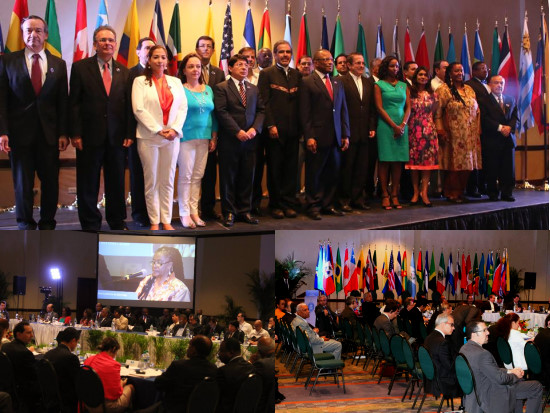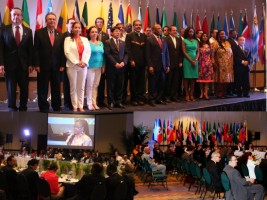|
||||||||||||||||||
|
|
Haiti - Politic : Opening of the Fourth Conference of States Parties to the Pact of San José 27/05/2014 14:05:07
The opening ceremony was chaired by Duly Brutus, the Minister of Foreign Affairs in the presence of delegates, Senior state officials, including Rose Anne Auguste, Minister Delegate to the Prime Minister, in charge of Human Rights and the Fight Against Extreme Poverty, also Head of the Haitian delegation, the President of the Superior Court of Auditors and Administrative Disputes (CSC / CA) and representatives of organizations of human rights. This first day was devoted to the work of the States Parties to the Pact of San José, follows three previous held respectively in Guayaquil (Ecuador, March 2013); Cochabamba (Bolivia, May 2013) and Montevideo (Uruguay, January 2014). The objective of these assizes is to strengthen the Inter-American System of Human Rights (ISHR), including by the universalization of the American Convention on Human Rights that is to say, the adherence to ISHR, of all Member States of the Organization of American States (OAS). The discussions focused on the efforts of States Parties in order to the accession of non-member states. Some States Parties have suggested that meetings be open to non-members states. The issue of relocation / relocation of Headquarters of the American Commission on Human Rights (IACHR) has also been addressed. In this context, the President Michel Martelly, has proposed to the conference, the candidacy of the Republic of Haiti to be the headquarters of the IACHR. A proposal warmly welcomed by the delegates. In her speech, the Minister Augustus traced the progress made, since 1959, year of the creation of the Commission and the remarkable achievements of the Commission for over 50 years.  Extract from the speech of the Minister Rose Anne Auguste : "[...] How many roads traveled since 18 August 1959 when the Commission was founded in Santiago de Chile! In fact, in a little more than 50 years of existence, it was able to evolve to become a crucial tool against injustice, a true force in the hemisphere and a model for the world, probably exceeding the imagination of its founders. Between the date of its foundation and the entry into force of the American Convention on Human Rights, the Commission has consistently supported the struggle for the defense of human rights and draw attention to the excesses or deficiencies in certain Member States. With the adoption in 1969 of the American Convention on Human Rights or Pact of San José, the mission of the Commission will be expanded to include normative instruments related to forced disappearances, torture, disappearances, sentencing death, violence against women, violations of economic social and cultural rights and discrimination against people with disabilities. The mandate of the Commission would be strengthened by a judicial arm with the establishment of the Inter-American Court of Human Rights in 1979. The evolution of the Commission reflected to a large extent the changes in the political realities of the hemisphere. Thus, during the last twenty years, with the end of most armed conflicts in the region as well as the transition from authoritarian regimes to democratic regimes, the Commission was able to shift its focus towards strengthening its analysis system of individual complaints. In this area, the achievements are remarkable as the facts show between 1997 and 2003 the number of petitions has increased by 170%, and just over the last six years, the Commission has received more than 7,500. Since the first two cases sent to the Inter-American Court of Human Rights in 1986 by the Commission, the decisions of this Court have continued to inspire significant changes in the laws of the countries of the hemisphere. In 2005, the Supreme Court of a State party to the Pact of San José explicitly referred to the decisions of the Inter-American Court of Human Rights as a precedent to declare unconstitutional of laws that limited the prosecution of persons accused of human rights violations rights. In 1990, the creation of the posts of rapporteurs made it possible to better attract the attention of governments on certain situations detrimental to human rights. Although the inter-American system for the protection of human rights was established by States willing to work together to the defense and promotion of human rights, it should pay tribute to the civil societywhich has often been the real engine of this system. Indeed, deployed by the movements of human rights in the 70s has contributed greatly to stimulate the development and strengthening of the system by the petitions and complaints, while often the other doors were closed [...]" HL/ S/ HaïtiLibre
|
|
|
Why HaitiLibre ? |
Contact us |
Français
Copyright © 2010 - 2024 Haitilibre.com |



